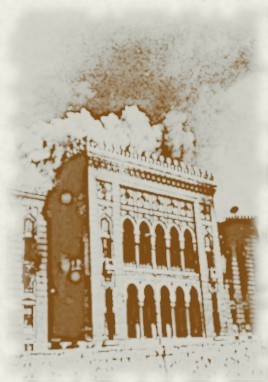


It has now been over a generation since the Bosnian War, the first disintegration of what had been Yugoslavia. Discussion of the conflict at the time largely focused on the horrifying violence taking place once again in Europe. Another aspect that shocked many, however, was the ways in which the destruction of cultural heritage served as a tool of genocide during the four years of war. Effective as any carpet-bombing raid, armies on all sides set fire to many historically-significant monasteries, schools, churches, and mosques. The most dramatic example occurred in May of 1992, when Serbian troops directed white phosphorous artillery shells at the Oriental Institute in Sarajevo, completely destroying one of the world's most important collections of medieval Islamic manuscripts. Two months later, the National and University Library of Bosnia and Herzegovina, housed in Sarajevo's historic city hall, was also effectively destroyed. Unique archival collections and rare codices were lost.
Computers today give us the impression that the internet makes all data available, and that an archive is a store of everything that has ever happened. Archivists are imagined as selecting the best items from a wealth of resources, so that we frequently hear that collections of various types have been "curated" by some unseen expert, with the authority to pick the best materials for users, from song lists to clothing lines to bread. Even Derrida wrote of the power that comes from controlling the archive.1 But none of this has anything to do with how historical archives work. It is not uncommon for historians to find that what they wanted to study is impossible, because no documentary evidence can be found in any collection. With new interests and new populations becoming the subject of humanities research (which is the normal evolution of academic scholarship), frustration grows as archives increasingly do not have what researchers need, and what they have come to expect from internet research. In this situation, many special collections have taken it upon themselves to increase their holdings to reflect their communities better, and in some cases, to address injustices of the past. Gaps in the archival record are understood to be a result of oppression, so the answer is to fill that emptiness. To expand collections, however, takes a great deal of creativity from both librarians and researchers, because in some cases the desired documents were never created or retained in the past. Dealing with absences has become a new model in serving patrons, even in a time when it feels like we are awash in information. The responses of wealthy American institutions to what they lack in the stacks will be important in understanding what needs to be done, mostly in terms of the absences that persist, to truly increase representation and understanding of peoples around the world. Librarians' thoughts on the destruction of materials in Sarajevo, show us some of their approaches to the issues of serving scholars when their subject cannot be covered by the usual tactics of research. In this catestrophic case, valuable resources provided information, and now they are gone, so people need new avenues to bypass the missing records and do research.
For the central focus of this study, all the posts on Twitter since January 1, 2007 by 64 prominent American libraries, or in four cases librarians, were reviewed through qualitative analysis. I began the list of users largely based on more than ten years of following rare book issues on Twitter myself, but additional Twitter accounts were added because of connections to cities with large numbers of Bosnian immigrants or large collections of Islamic manuscripts. I included several complete academic library systems at major universities, because they oversaw libraries with relevant special collections and seemed to dominate the social media of the campus libraries. I also included some small, specialized libraries that had a focused interest on cultural heritage or book history.
Initial results just how few of the tweets related to this topic directly. For instance, tweets about Serbian, (i.e. looking for topics such as Serbian actions, Serbian forces, Serbian war crimes, etc.) tended to cover a wide variety of issues, few of them having anything to do with libraries during the Bosnian war.
By comparing focused collections to the general patterns of academic libraries in the United States we can see the importance of determined efforts to collect on specific topics in response to world events. The Center for Bosnian Studies, which was the Bosnian Memory Project until just recently, is housed at Fontbonne University in St. Louis, the city with the largest population of refugees from Bosnia-Herzegovina in the country. The library responds to the disruptions of war and emigration with an effort to record this history as it is going on, and to recover items dispersed by the conflicts in the former Yugoslavia because this activity is important to the community and many of the students at Fontbonne in terms of their sense of identity and belonging. "The Center began as the Bosnia Memory Project in 2006 and was renamed the Center for Bosnian Studies to reflect its increasing role as a hub of knowledge and resources on Bosnia. Part of the College of Arts and Sciences at Fontbonne University, it preserves stories and artifacts from the Bosnian war and genocide, through an oral history project, special collections with many rare items, and a growing digital collections of unique resources on Bosnia and its diaspora."1 Their holdings include a collection of propaganda distributed during the Bosnian War. Few libraries in the world have items like this, according to WorldCat. A search of the Yale library system brought up only a few books that have any connection to this topic.
